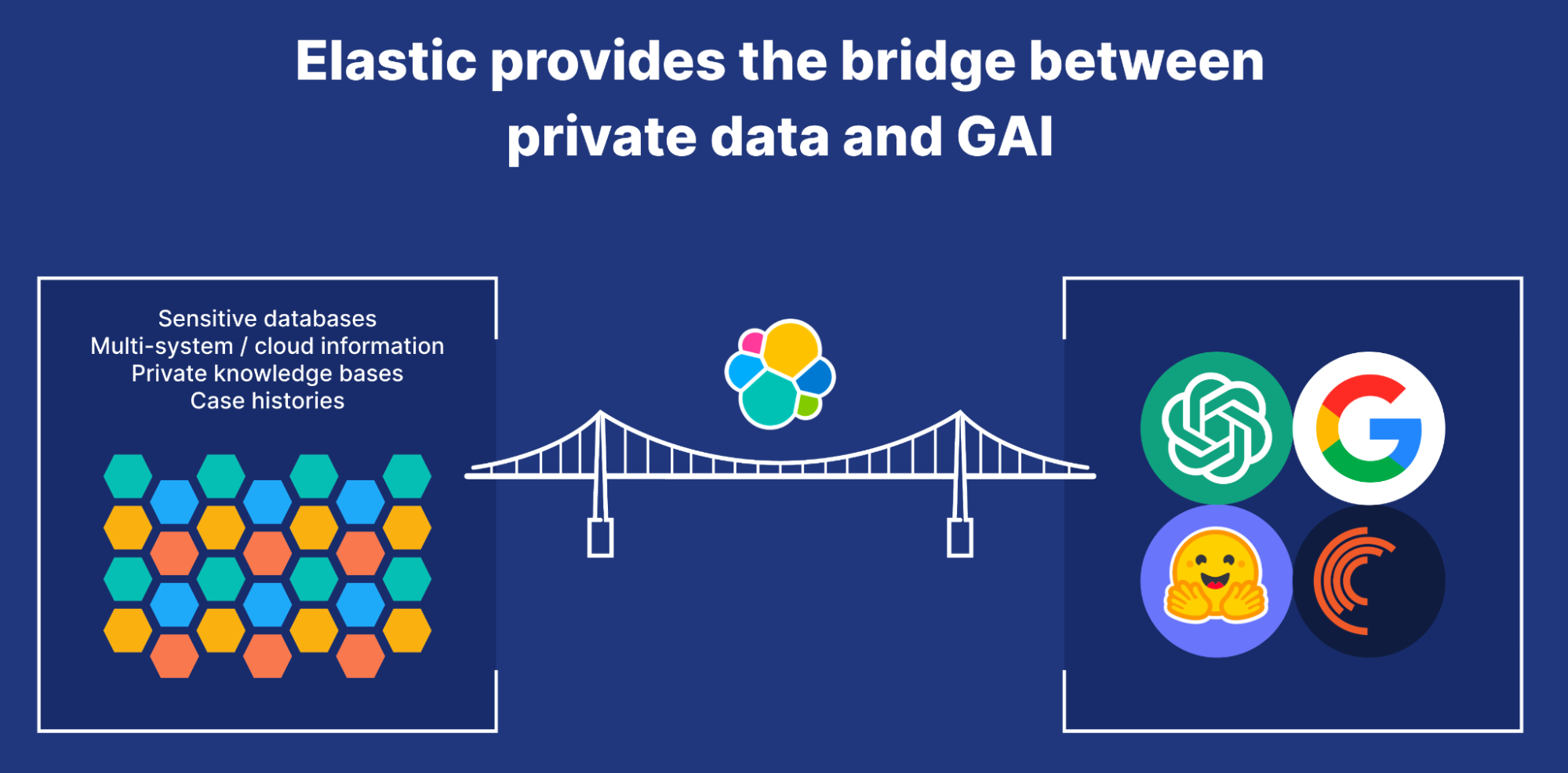5 stand-out retail use cases for generative AI + Elasticsearch

Generative AI (GAI), powered by models like OpenAI’s ChatGPT, is rapidly gaining attention in the retail industry for its potential to revolutionize customer experience and drive innovation. The technology has the ability to improve every corner of the retail industry, from tailored ecommerce search and modernized customer support to omnichannel marketing and even predictive maintenance in supply chains. In fact, the many promising retail use cases for generative AI, which executives previously predicted would take years to achieve, might ultimately be delivered in the very near future.
However, retailers are understandably cautious in their approach to this technology due to the notable limitations of GAI. In a previous blog post, we discussed both the benefits and the risks retailers are presented with when considering implementing GAI technology in their organizations, as well as how the Elasticsearch Relevance Engine™ (ESRE™) can help overcome challenges and create new opportunities. With its flexible suite of tools, ESRE lets businesses build AI-powered search applications, merging the capabilities of machine learning with text search. ESRE also empowers ecommerce developers to enhance search applications by employing sophisticated algorithms that integrate with large language models. Furthermore, ESRE effectively addresses challenges of GAI related to privacy, scalability, and cost, thereby enabling retailers to create search experiences that build on user intent to deliver improved customer experience.
In this blog post, we’ll explore possible use cases for GAI in retail and how ESRE can be applied to help organizations create the ultimate user experience in their applications.

Retail use cases for generative AI and ESRE
There has already been plenty of discussion around the seemingly infinite number of GAI use cases in retail. But as retailers start exploring the potential of this technology, a number of those use cases stand out:
Personalized search experiences
Personalization enables organizations to offer highly tailored experiences that appeal more directly to the specific interests or pain points of a customer or employee. Search technology is already powering the personalized digital experiences that customers experience everyday. In fact, 88% of online shoppers are more likely to continue to shop on websites that offer a personalized experience, according to a study by Wakefield Research.
ESRE provides robust search capabilities, allowing retailers to build fast, highly relevant search experiences for their online stores. When combined with the generative capabilities of large language models, customers can get results tailored to their location, demographic, or preference — leading to improved customer satisfaction and conversion rates. Precision context windows with Elastic also help reduce data footprint and expenses.
Enhanced customer service
Outstanding support starts with getting answers for your customers. Generative AI can analyze and learn from historical customer data including customer support interactions, from emails and chat logs to support tickets. It can generate automated responses based on this data, providing quick and accurate answers to frequently asked questions or common issues. This saves time for both customers and support agents, streamlines self-service support, and allows agents to focus on more complex or personalized inquiries.
ESRE serves as the perfect backbone for this use case, helping customers find information quickly and easily with semantic search. The Elasticsearch Relevance Engine includes a proprietary out-of-the-box semantic search model as well as a production grade vector database and hybrid search ranking. It gives developers a flexible foundation on which to build rich semantic search, vector search, and hybrid search applications, which can be used by service agents. Elastic also includes native support for role-based and attribute-based access control, so customers and agents only see information they have access to.
Sophisticated fraud detection
GAI holds immense potential for the retail industry by aiding in the identification of fraudulent activities and the detection of anomalies. Through the process of pattern learning from existing data, generative models can predict new data points that align with the learned patterns. Retailers can leverage these capabilities in combination with Elastic to compare real-time customer interactions and transactions with predicted patterns. This integrated approach helps retailers proactively identify uncommon or fraudulent behavior that may otherwise elude detection through conventional rule-based systems alone.
Modernized brick-and-mortar
New technology that enables a guided shopping experience is becoming more prevalent. Retailers can now imitate the online shopping experience by pairing real-time demographic information with potential purchase preferences. This information is then correlated, in real time, with in-store video screens — such as smart shelves — which aim to deliver this information as part of the interactive experience of choosing a product. This amounts to dynamically combining data across disparate sources and presenting it together with a unified experience. Generative AI coupled with ESRE makes this task easier with a single platform to consume data and insights. This is done while enabling privacy and security via Elastic’s native support for role-based and attribute-based access controls.
Predictive maintenance
Retailers can collect data from various sources, such as sensors, equipment logs, and historical maintenance records, to build a comprehensive data set. With Elastic, powered by ESRE, retailers can activate this information to automate monitoring, accelerate root cause analysis, and optimize operations by applying machine learning. This helps drive increased productivity, faster innovation, and more trustworthy customer experiences. Retailer supply chain and operations teams can continuously monitor this data in real time to identify patterns and anomalies that may indicate potential inventory issues or equipment failures.

In an industry where competition is sky-high and differentiation is key, retailers must constantly innovate to remain relevant in the market. With ESRE, retailers can enhance their search capabilities to deliver more accurate and relevant results to their customers and employees, while ensuring sensitive data remains protected. By combining GAI with the powerful capabilities of Elastic, retailers can better understand their customers, adapt to market changes, and deliver exceptional experiences.

The release and timing of any features or functionality described in this post remain at Elastic's sole discretion. Any features or functionality not currently available may not be delivered on time or at all.
In this blog post, we may have used or referred to third party generative AI tools, which are owned and operated by their respective owners. Elastic does not have any control over the third party tools and we have no responsibility or liability for their content, operation or use, nor for any loss or damage that may arise from your use of such tools. Please exercise caution when using AI tools with personal, sensitive or confidential information. Any data you submit may be used for AI training or other purposes. There is no guarantee that information you provide will be kept secure or confidential. You should familiarize yourself with the privacy practices and terms of use of any generative AI tools prior to use.
Elastic, Elasticsearch, ESRE, Elasticsearch Relevance Engine and associated marks are trademarks, logos or registered trademarks of Elasticsearch N.V. in the United States and other countries. All other company and product names are trademarks, logos or registered trademarks of their respective owners.